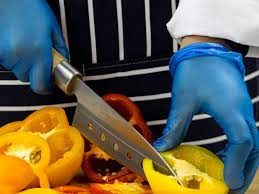When striving for excellence in the food service industry, every detail matters, including the seemingly small actions of staff during their daily routines. A recent incident that prevented a business from achieving the coveted 5-star hygiene rating was a staff member's oversight in not changing gloves after handling cash.

This might seem minor, but it underscores a critical aspect of food safety: preventing cross-contamination.
Understanding Local Food Hygiene Rating Schemes
The Food Hygiene Rating Scheme (FHRS) in England, Wales, and Northern Ireland, and the Food Hygiene Information Scheme (FHIS) in Scotland, evaluate food businesses on their hygiene standards. The schemes are designed to help consumers choose where to eat or shop for food by giving them a clear idea of a business’s hygiene standards.
The Food Hygiene Rating Scheme (FHRS) in England, Wales, and Northern Ireland
Managed by the Food Standards Agency (FSA), the FHRS rates businesses on a scale from 0 (urgent improvement required) to 5 (very good). Inspections by local authority food safety officers determine these ratings, focusing on food handling practices, the condition of the premises, and food safety management.
The Food Hygiene Information Scheme (FHIS) in Scotland
Operated by Food Standards Scotland, the FHIS differs slightly by offering a "Pass" or "Improvement Required" rating, aiming to simplify the assessment for consumers. Additionally, Scotland offers the "Eat Safe Award" to businesses that surpass legal compliance.
Inspection Focus Areas
- Hygienic Food Handling: This covers all aspects of food handling within your business, from preparation and cooking to cooling and storage. Ensuring that these processes are carried out hygienically is crucial.
- Condition of Facilities and Building: The physical state of your premises will be assessed for cleanliness, layout, lighting, ventilation, and the adequacy of pest control measures. Proper maintenance of the facility plays a significant role in achieving a high rating.
- Management of Food Safety: Inspectors will evaluate how your business manages and documents food safety. This involves looking at your processes, checks, staff training, and record-keeping to ensure that food safety is prioritized.
The Ultimate Guide to Achieving a 5-Star Hygiene Rating
Achieving a 5-star rating or its equivalent across the UK and Ireland requires unwavering dedication to food safety standards. Here’s a comprehensive guide to ensure your business is positioned for success:
- Commit to Continuous Staff Training
Regular Training Sessions: Implement ongoing food safety training for all staff, emphasising the importance of practices such as frequent hand washing and appropriate glove use.
Certification and Documentation: Maintain up-to-date records of all training activities, certifications, and daily hygiene practices.
- Uphold Impeccable Food Handling Practices
Adopt and Implement HACCP: Utilize the Hazard Analysis and Critical Control Point (HACCP) system to manage food safety risks effectively.
Monitor and Record: Keep detailed logs of temperature checks, cleaning schedules, and all procedures related to food safety.
- Ensure Rigorous Personal Hygiene Standards
Hand Hygiene: Establish a strict regime for hand hygiene, ensuring that staff wash their hands thoroughly at designated hand washing stations, especially after handling money or waste.
Proper Use of Gloves: Develop clear guidelines for the use of gloves, including changing them between tasks to prevent cross-contamination.
- Excel in Cleanliness and Facility Maintenance
Cleanliness: Keep all areas of your premises, especially food preparation areas, meticulously clean and well-maintained.
Pest Control and Waste Management: Implement effective pest control and waste management systems to prevent infestations and contamination.
- Develop a Culture of Food Safety Excellence
Food Safety Culture: Foster a workplace culture where food safety is a shared responsibility and valued part of daily operations.
Feedback and Improvement: Encourage open communication about food safety practices and use feedback for continuous improvement.
- Navigate the Inspection Process with Confidence
Self-Inspections: Regularly conduct self-inspections to identify and rectify potential issues before the official inspection.
Respond to Feedback: Take immediate action to address any improvements suggested during or after inspections.
Displaying Your Rating
While it is mandatory in Wales and Northern Ireland to display your rating, doing so voluntarily in England and Scotland can also be beneficial, serving as a testament to your commitment to high standards.
Conclusion
The journey to a 5-star hygiene rating is continuous and demands diligence, attention to detail, and a proactive approach to food safety. By embracing these principles, food businesses in the UK and Ireland can not only achieve the highest hygiene standards but also set a benchmark for excellence in the food service industry. This commitment to hygiene excellence not only protects customers but also elevates the entire dining experience, contributing to a thriving food industry landscape.